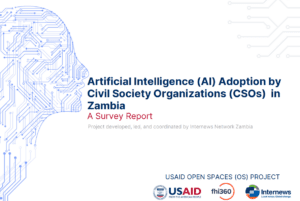Internews Network Zambia recently launched its second survey report, focusing on the adoption of Artificial Intelligence (AI) by Civil Society Organizations (CSOs) in Zambia. The research, conducted through the USAID Open Spaces Project, provides a comprehensive analysis of how AI is being integrated within the civil society sector.
The findings indicate that 44% of CSOs are using AI tools, with generative AI being the most widely used tool. Additionally, 96% of non-users are considering AI integration in their work. Among the CSOs using AI, chatbots and conversational AI like ChatGPT are the most popular, used by 25% of these organizations. Image and video analysis tools are used by 15%, text analytics by 13%, and social media management tools by 20%. However, a majority of 54% of CSOs have not integrated AI into their operations, and a small fraction, 2%, remains uncertain about their use of AI tools.
Perceptions of AI’s impact on job security vary significantly. When asked to rate the threat level from 1 (no threat) to 5 (extreme threat), 48% of respondents do not see AI as a threat (level 1). Meanwhile, 13% perceive AI as a low threat (level 2), 26% consider it a moderate threat (level 3), 9% view it as a significant threat (level 4), and 4% regard it as an extreme threat (level 5). These diverse views underscore the need for further dialogue on AI’s role in the workplace.
Only 18% of organizations offer training to their staff on AI tool usage, highlighting a significant gap in AI literacy. The survey also highlights the ease of AI integration: 44% find it easy, 49% rate the experience as moderate, and 7% find it difficult or very difficult. These figures suggest that while some CSOs are integrating AI tools, they still face challenges that may require additional support. Furthermore, CSOs noted AI biases, particularly in its failure to adequately address the needs of regions like Zambia and Africa, including the representation of Africans in tech companies, lack of accurate data, and funding.
Some CSOs cited that the AI tools they are using do not have correct or ample information on Zambia and most of the AI tools are not tailored to suit the unique circumstances of their communities; “It’s not made for us,” says a participant from Livingstone. This highlights the need for more inclusive and representative AI development practices that consider the specific needs and contexts of different regions.
The challenges associated with AI adoption in Zambian CSOs are multifaceted. Ethical considerations, such as data privacy and choice, are significant concerns. Technical challenges include integrating AI with existing legacy systems. Financial constraints also pose a significant barrier, as the implementation and maintenance of AI systems require substantial investment. Data quality and bias are identified as critical issues that need to be addressed to ensure the ethical and effective operation of AI systems. Additionally, language barriers present unique challenges.
Our first survey report was released last year (2023) and focused on the adoption of AI by journalists in Zambia.
